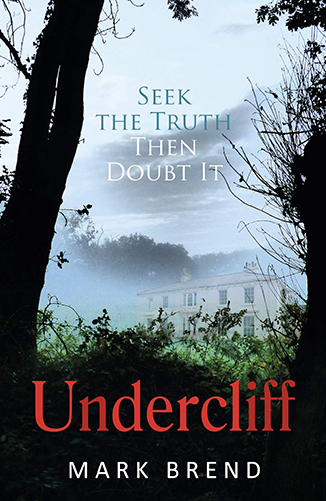NIRVANA BETRAYED
Summer, 1972: NASA launches the Copernicus Satellite (OAO 3) into space: Bobby Fischer defeats Boris Spassky at the World Chess Championship in Iceland: Uganda’s president Idi Amin expels the country’s Asian minority, and thirty-something year old Martyn Hope moves to London after the collapse of his marriage, unaware that his life will descend into a vortex of fear and uncertainty. Undercliff is Mark Brend’s intelligent, subtly observed study of how an ordinary man is drawn into a religious sect whose intentions he will be forced to question.
On the surface, the Olive Grove community seems harmless. The members are friendly while the atmosphere in the church is informal, all of which puts Martyn at ease, undermining his initial guardedness. The Olive Grove’s weekly meetings soon become a fixture of his life and it isn’t long before he meets the Two, Magnus Eves and Simon Hill, the church’s middle-aged leaders responsible for its spiritual direction. Magnus and Simon are unconventional religious mentors. They interact with their followers, keeping them close: hugs and backslaps are preferred to handshakes: everyday speech is littered with life affirming statements of the obvious along with casual Americanisms – “You guys”, “Oh man”, “We’re going to do our thing now” – while sermons referencing the books of Daniel and Revelation and the writings of US evangelist Hal Lindsey, are preached with the enthusiasm of a happy-clapper at communion. Small wonder that Martyn can’t help but see them as “mildly counter-cultural, in a 60s hippy, polytechnic lecturer sort of way.”
The Two are never angry, although with hindsight, the one-time Martyn witnesses that emotion is when Magnus raises his voice to him after he opens the door to a room that’s off limits. Is it a red flag warning that all is not well in nirvana? Perhaps, although the most obvious sign that something really isn’t right is Magnus and Simon’s eerie ability to speak in perfect unison, even finishing each other’s sentences. Initially Martyn is taken aback, although after a while he sees this as normal rather than strange. It is a casual yet significant observation as Martyn doesn’t realise, until much later, that the Olive Grove has blinded him to what any reasonable person would regard as sinister. Strange things are normalised although the realisation the Two might be gaslighting him is only apparent after he starts a relationship with Amelia, a young Belgian woman who joins the group shortly after arriving in London. Their courtship, though unremarkable, awakens feelings of tenderness in Martyn, which Amelia gradually reciprocates. The couple get even closer during a long weekend at Undercliff, a semi-dilapidated Georgian house in a Devonshire village bought by the Two as a spiritual retreat for the church members. For Martyn, there is a prospect of happiness after the aimless drifting that followed his divorce, until Amelia’s sudden disappearance crashes that hope. Where has she gone? Do Magnus and Simon know where she is? How far will they go to stop him leaving the Olive Grove?
Underhill is a gripping, well structured novel with a simple yet taut style of writing and a first-person narrative that rings with authenticity. Martyn tells his story with an honesty devoid of self-pity and in a tone that is almost confessional. What is he confessing to when he is a victim rather than a perpetrator of manipulation? Bewilderment at being taken in by the dangerous charisma of the Two, or the casual admission of loneliness? Loneliness made him vulnerable and the Olive Grove stepped in to fill the solitude gap. Winning his confidence was easy as Martyn doesn’t stand out in anyone’s crowd. He was an obvious target for a couple of slick operators, lending weight to the story’s running metaphor of the unscrupulous preying on the vulnerable. The Olive Grove manipulates with words, gestures masquerading as kindness, and promises of better things to come in exchange for loyalty. It is a morally deceitful enterprise, as Martyn will discover to his cost.
Underhill qualifies as both an atmospheric drama and a psychological thriller because of its theme and the believability of its characters. The prologue kicks off with an intriguing sentence that psyches up the reader to prepare for the unexpected: “The day after reading the news of my death I went for a walk”. There is mystery in that statement and solving it will mean diving into shadowy, uncharted territory. Martyn is our guide, but is he reliable? Brend teases the possibility he could be overreacting to his situation. His quest to find Amelia becomes obsessive and as the search for her intensifies, he suspects he’s being watched. Are those fears justified, or is Martyn’s imagination getting the better of him?
Underhill succeeds because of the realism of the story and the susceptibility of its main character. Martyn could be anyone of us, which is why we empathise with his plight. He is challenged in a way that few of us ever will be, yet he will find the strength to rise above his own mediocrity. A haunting plot twist, saved for the epilogue, brings an element of closure to a life overhung with disappointment. Brendt’s story is a powerful statement about the dangers of manipulation and the potential for tragedy when a gut instinct is ignored.
Reviewed by Juliette Foster




